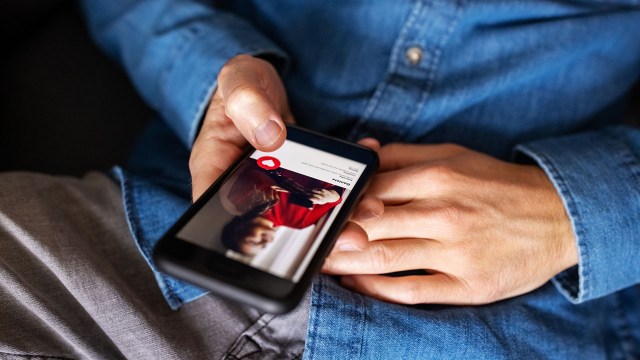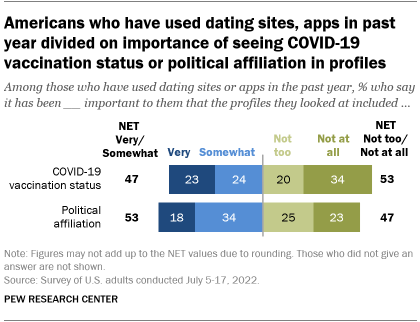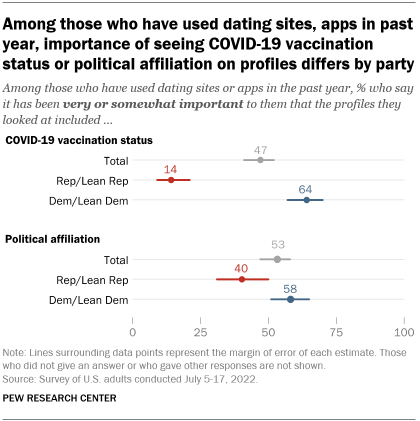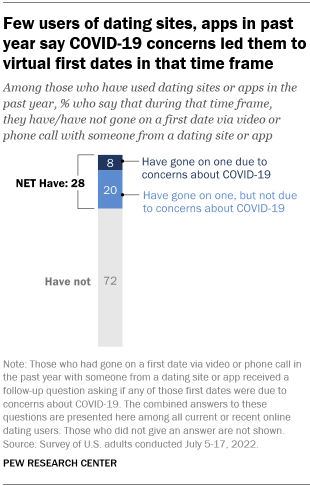
The COVID-19 pandemic has caused some Americans who use dating sites and apps to look for a new compatibility clue: Their prospective match’s vaccination status. Among U.S. adults who have used a dating site or app in the past year, about half (47%) say it has been at least somewhat important to them that the profiles they look at include someone’s COVID-19 vaccination status, according to a July Pew Research Center survey. This includes about a quarter (23%) who say it’s been very important to see this information.

Still, views are divided on this topic: Some 53% of those who have used a dating site or app in the past year say it’s been not too or not at all important to see someone’s COVID-19 vaccination status.
The survey, conducted July 5-17, 2022, found that 9% of U.S. adults have used a dating site or app in the past year. These Americans are the focus of this analysis and are also referred to as “current or recent online dating users” throughout this post. (This group includes 5% of U.S. adults who said they were currently using a dating site or app, as of the July survey.)
Pew Research Center conducted this study to understand the considerations that online dating users face today. This survey was conducted among 6,034 U.S. adults from July 5-17, 2022. This included 4,996 respondents from the Center’s American Trends Panel (ATP), an online survey panel that is recruited through national, random sampling of residential addresses. This way nearly all U.S. adults have a chance of selection. It also included an oversample of 1,038 respondents from Ipsos’ KnowledgePanel who indicated that they are lesbian, gay or bisexual (LGB), with oversampled groups weighted back to reflect proportions in the population. The survey is weighted to be representative of the U.S. adult population by gender, race, ethnicity, partisan affiliation, education and other categories. Read more about the ATP’s methodology.
Here are the questions used for this analysis, along with responses, and its methodology.

Views on the importance of seeing someone’s COVID-19 vaccination status split sharply along partisan lines. Current or recent online dating users who are Democrats or lean toward the Democratic Party are far more likely than their Republican and GOP-leaning counterparts to say someone’s vaccination status is important for them to see.
This mirrors partisan patterns in related Center research. Democrats are also more likely than Republicans to be fully vaccinated against COVID-19 and to have received a booster. And among daters generally – not just those using dating sites or apps – Democrats are more likely than Republicans to say they would only go out with someone who is vaccinated.
Political affiliation itself is another piece of information that some online dating users consider important as they browse people’s profiles, according to the new survey. About half of those who have used dating sites or apps over the past year (53%) say seeing political affiliation on profiles has been at least somewhat important to them, including 18% who say it has been very important. Another 47% say it’s been not too or not at all important to them. Views on this question also differ by party among these online dating users, with Democrats somewhat more likely than Republicans to say it’s important to see someone’s political affiliation on an online dating profile.
The perceived importance of seeing political affiliation in dating profiles has risen among recent online dating users since the last time the Center asked this question in 2019. The share who say seeing this information is important has risen from 40% of those who were current or recent online dating users in 2019 to 53% of current or recent online dating users today. This largely reflects a 16 percentage point rise among those who are Democrats or Democratic leaners.
The profile “signals” that online daters look for reflect changing societal circumstances – such as the emergence of the pandemic – but also new features from the companies that run dating sites and apps. For example, as COVID-19 vaccines were rolled out, companies noticed mentions of vaccination status increasing in user profiles and some apps debuted profile “badges” so users could quickly determine whether a potential match’s vaccination status was in sync with their own. Still, online daters have long scanned dating profiles to quickly evaluate a variety of characteristics that might be important to them – anything from physical attraction to religious beliefs.
28% of Americans who’ve used dating sites, apps in past year have gone on virtual first date with another user during that time

Beyond exploring what is important to users when perusing profiles, the survey also found that 28% of current or recent online dating users have gone on a first date by phone or video call over the past year with someone they met on a dating site or app. However, only a small share of all Americans who have used a dating site or app in the past year (8%) say that they have been on a virtual date during that time frame specifically due to concerns about the COVID-19 pandemic.
Another one-in-five say they went on at least one virtual first date with someone from dating sites or apps in the past year, but report that concern about the coronavirus wasn’t a reason they opted to meet virtually.
Connecting via phone or otherwise before meeting in person is not a new idea. But it gained renewed attention as the pandemic took hold, with some dating platforms debuting in-app video calls to help users find ways to keep their dating lives alive.
Video dates have drawn mixed reviews from users. Still, some companies that run dating platforms are betting on the format becoming more integrated into the lives of daters in the future.
Note: Here are the questions used for this analysis, along with responses, and its methodology.



